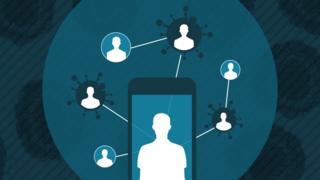
People who have been in close contact with someone found to have Covid-19 are now being traced.
NHS contact tracers will ask people they get in touch with to self-isolate for a fortnight. But plans for a tracing app have been delayed until winter at the earliest.
How does contact tracing work in England?
If you develop coronavirus symptoms and test positive for the disease, you'll be contacted by text, email or phone and asked to log on to the NHS Test and Trace website.
There you will be asked for personal information including:
- Name, date of birth and postcode
- Who you live with
- Places you visited recently
- Names and contact details of people you have recently been in close contact with
Close contacts are:
- people you've spent 15 minutes or more with at a distance of less than 2m
- Sexual partners, household members or people with whom you have had face-to-face conversations at a distance of less than 1m
Contact must have taken place within a nine-day period, starting 48 hours before symptoms appeared.
No-one contacted as a result of you testing positive for coronavirus will be told your identity.
A parent or guardian will need to give permission for a call with under-18s to continue.
How is the tracing scheme going?
The scheme - which the prime minister claimed would be "world-beating" - was launched on 28 May. Between 28 May and 17 June:
- 20,968 people who tested positive had been referred to the scheme
- Of these, 15,225 (72.6%) provided details of recent contacts
- The contacts amounted to 128,566 people - of these,113,925 people (88.6%) were reached and asked to self-isolate
When will there be a coronavirus app?
The government also planned to launch a tracing app, which would automatically alert users if they had been in contact with another user with coronavirus.
Are other countries using apps?
Several other countries have introduced contact-tracing apps:
- France's app has been downloaded by two million people, although a quarter of those have since uninstalled it. The data is held on a government database
- Germany's app has been downloaded 13 million times, out of a population of 83 million. It does not have a central database
- India's app has had 131 million downloads and the country says it has traced 900,000 people to tell them to isolate.
- South Korea uses an app to check that travellers to the country are observing quarantine rules.
What about other parts of the UK?
Northern Ireland was the first of the four UK administrations to bring in contact tracing, which is being carried out exclusively by telephone at the moment.
Scotland's system is called NHS Test and Protect, and has recruited 2,000 contact tracers. It was launched as the easing of lockdown restrictions began.
In Wales, the ''test, trace, protect'' system launched on 1 June.
What if I am contacted by the tracers?
Anyone deemed at risk of infection will be told to stay at home for 14 days from the point where they had contact with the person who tested positive.
You will be asked to self-isolate, even if you do not have symptoms, to stop the danger of the virus spreading.
You should not leave your home for any reason. If you need food or medicine and live alone, you should order it online or by phone, or ask friends and family to drop it off on your doorstep.
If you live with other people they won't have to self-isolate, unless they also develop symptoms, but they must take extra care around you regarding social distancing and hand washing.
How do I avoid scammers?
The NHS Test and Trace service will only be calling from 0300 0135 000. They will not ask you:
- for bank details, or payments
- for details of any other accounts, such as social media
- to set up a password or PIN number over the phone
- to call a premium rate number, such as those starting 09 or 087
Do I have to follow the instruction to self-isolate?
It's currently voluntary. But the Department for Health has said that if people don't comply, "we will not hesitate to introduce tougher measures - for example making visits to check they're home, or issuing fines if they are found outside the house".
What about sick pay?
If people can't work from home, the government says employers must ensure any self-isolating employee is receiving sick pay and give them the option to use their paid leave days if they prefer.
Self-employed people who are self-isolating but can't work from home can apply for a grant through the income support scheme, the government says, although this is designed to cover three months' worth of profits.